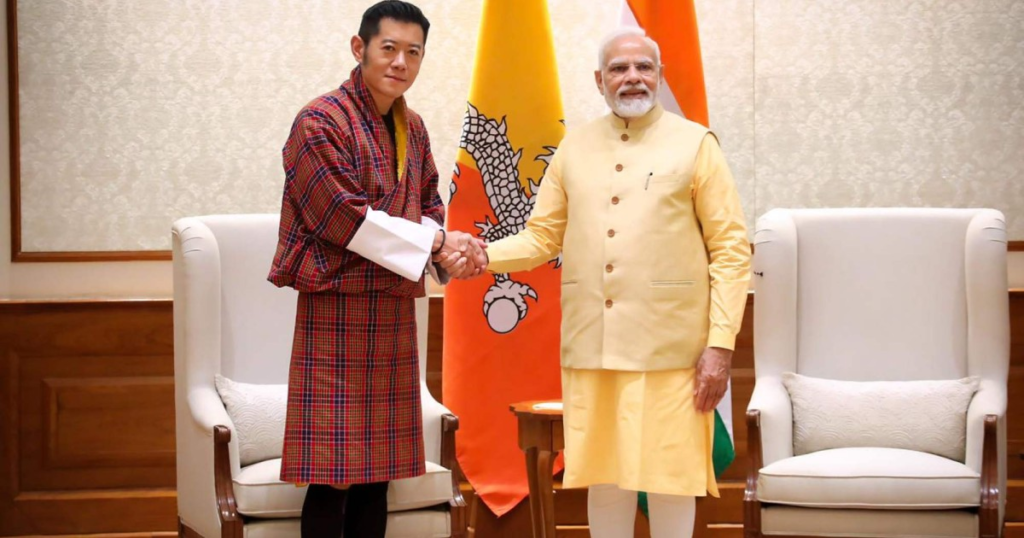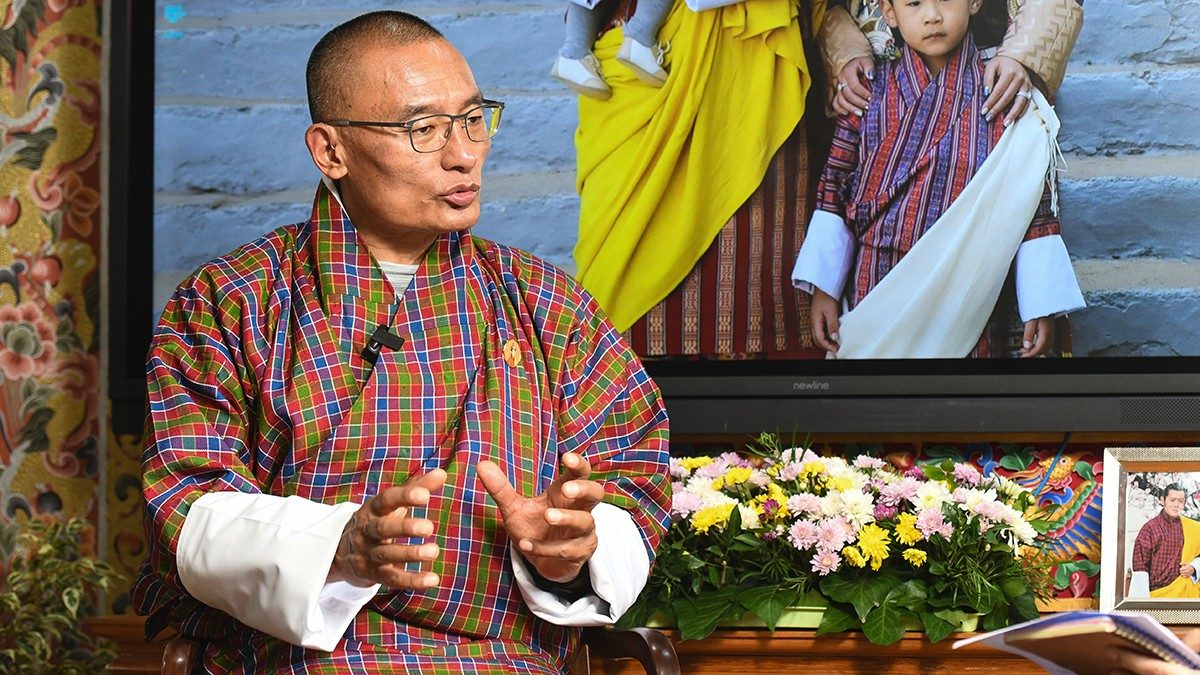In a rapidly changing global landscape, Bhutan PM Tshering Tobgay has voiced his belief in India’s leadership and its ability to tackle some of the world’s most pressing challenges. Speaking at the NDTV World Summit, Tobgay highlighted India’s influence not only in the region but across the globe.
His remarks underline the importance of India’s role in addressing issues like pollution, climate change, and international conflicts, positioning India as a crucial leader in the Global South.
India’s Impact on Bhutan: A Clean Energy Future
Prime Minister Tshering Tobgay made it clear that India’s advancement will have a direct impact on Bhutan, especially in terms of environmental health. Bhutan, a small, landlocked country nestled in the Himalayas, receives most of its air from the Indian subcontinent. As a result, any pollution that affects India inevitably finds its way to Bhutan.
“The less pollution there is in India, the less pollution we have to endure,” Tshering Tobgay said, underscoring the critical link between the two nations when it comes to environmental concerns. Pollution from India’s industrial centers, vehicle emissions, and other sources has long been a challenge for Bhutan, despite its own efforts to remain one of the world’s greenest and most eco-conscious nations.
Read : Anil Ambani Reliance Group to Build Bhutan’s Largest Solar Plant
India, which is undergoing rapid industrialization and urbanization, is also dealing with the consequences of air pollution and environmental degradation. However, Tshering Tobgay expressed optimism that as India continues to develop and embrace more advanced technologies, it will naturally reduce pollution levels. This, in turn, will benefit Bhutan by providing cleaner air.
In particular, Tshering Tobgay emphasized India’s growing commitment to renewable energy and green technologies, which he believes will play a key role in reducing pollution across the region. As part of his visit to the NDTV World Summit, the Bhutanese Prime Minister even planned to take a symbolic city tour on a hydrogen fuel bus.
Read : What is Bhutan’s High Value Low Volume Policy for Successful Tourism
This gesture highlighted his excitement for India’s potential in renewable energy and the possibility of Bhutan contributing to India’s green hydrogen production using its vast hydropower resources.
Bhutan’s ability to generate renewable energy through hydropower has long been one of its key economic strengths. By working together with India on green hydrogen and other renewable projects, both countries can foster a cleaner, more sustainable future. Tshering Tobgay sees this collaboration as mutually beneficial, especially as the world increasingly looks to India for solutions to global energy and environmental challenges.
India’s Leadership on Global Issues
Beyond the environmental impact, Tobgay’s remarks at the NDTV World Summit also highlighted India’s leadership on a broader range of issues. From economic challenges to the COVID-19 pandemic, he praised India’s role in offering solutions to the world’s most pressing problems.
“Be it economic problems, the world looks to India as a market,” Tobgay said, referencing India’s significance as one of the world’s largest and fastest-growing economies. With a population of 1.5 billion people and a rapidly expanding middle class, India’s economic decisions and policies reverberate across the global market.

India’s role during the COVID-19 pandemic was another example of its global leadership. As countries around the world struggled with vaccine shortages and medical supplies, India stepped in to provide vaccines and essential medicines to a wide array of nations. The country’s expertise in pharmaceutical manufacturing played a crucial role in global efforts to combat the pandemic, earning India praise and recognition for its humanitarian contributions.
Tshering Tobgay also mentioned India’s potential to mediate in international conflicts, particularly the ongoing war between Russia and Ukraine. While many countries have struggled to maintain diplomatic relationships amid the conflict, Tobgay expressed his belief that if any world leader could help resolve the crisis, it would be India’s Prime Minister Narendra Modi.
India’s balanced diplomatic approach, maintaining relationships with both Russia and the West, positions it uniquely to offer a path toward dialogue and resolution.
In the context of the Global South, India is seen as a leader and a role model for other developing nations. Tshering Tobgay emphasized that India’s leadership on economic issues, climate change, and peace efforts sets an example for countries facing similar challenges.
He also acknowledged that with such a large population and a growing economy, India faces significant challenges of its own, particularly when it comes to balancing development with environmental responsibility.
India’s Commitment to Renewable Energy and Climate Change
One of the key themes that Prime Minister Tshering Tobgay highlighted was India’s commitment to fighting climate change and transitioning toward renewable energy. As the world grapples with the urgent need to reduce carbon emissions and limit global warming, India has emerged as a major player in the push for clean energy solutions.
“India is exercising leadership, being a role model for the world,” Tshering Tobgay said, pointing to Prime Minister Modi’s efforts to promote renewable energy both within India and on a global scale. A key example of this is the International Solar Alliance (ISA), a global initiative launched by India to promote solar energy production and usage.
The ISA brings together countries from around the world, particularly those with abundant sunlight, to collaborate on solar projects and increase the adoption of renewable energy.

Tshering Tobgay praised India’s leadership in this area, noting that the Solar Alliance reflects India’s commitment not only to its own energy transition but to helping other nations achieve their renewable energy goals. He emphasized that this kind of leadership is exactly what the world needs to combat climate change.
At the same time, Tshering Tobgay acknowledged that India’s rapid economic growth comes with challenges. A growing economy requires vast amounts of energy, which in turn can lead to increased pollution if not managed properly. However, Tobgay expressed confidence that India is not shirking its responsibilities. With initiatives like the Solar Alliance and the push for hydrogen fuel technology, India is positioning itself as a leader in the global fight against climate change.
India’s renewable energy goals are ambitious. The country has set a target of achieving 500 gigawatts (GW) of renewable energy capacity by 2030, with solar and wind power playing key roles in this transition. India is also investing in electric vehicles, clean transportation, and sustainable infrastructure to reduce its carbon footprint.
The focus on hydrogen as a potential clean energy source is particularly promising. Hydrogen fuel, when produced using renewable energy sources like hydropower, has the potential to revolutionize the energy landscape by providing a zero-emission alternative to traditional fossil fuels. Bhutan, with its vast hydropower resources, could play a key role in helping India achieve its hydrogen fuel ambitions.
Tobgay’s remarks at the summit reflect the optimism that many in the Global South have for India’s leadership on climate issues. As India continues to grow and develop, its choices and policies will have a far-reaching impact on the environment and the global fight against climate change.
The collaboration between India and Bhutan in the realm of renewable energy, particularly in green hydrogen, could serve as a model for other countries seeking to balance development with sustainability.

Prime Minister Tshering Tobgay’s speech at the NDTV World Summit highlights the unique position India holds on the global stage. Whether it’s addressing environmental challenges, leading the fight against climate change, or serving as a beacon of hope during international crises, India is increasingly viewed as a country capable of solving some of the world’s most difficult problems.
For Bhutan, India’s success is crucial. The relationship between the two nations, particularly in terms of environmental impact and renewable energy collaboration, serves as a reminder that in a connected world, one country’s actions can have a profound effect on its neighbors.
As India continues to advance and embrace green technologies, both nations stand to benefit from cleaner air, sustainable energy, and economic cooperation. Prime Minister Tobgay’s optimism about India’s future reflects a broader sentiment shared by many in the region: that India, with its vast resources, growing influence, and commitment to leadership, is well-positioned to tackle the challenges of the 21st century.

